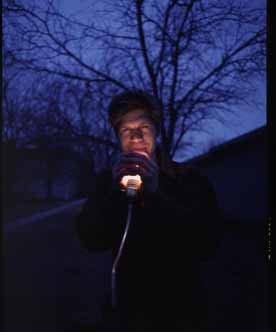|

|
"It's
a really challenging thing to work with Lambchop. You have
to have a great deal of restraint to not step all over everyone."
|
|
|
At
the same time, McManus had met Kurt Wagner, the frontman for the
Nashville-based ensemble Lambchop, a backporch orchestra that contained
as many as 15 members playing a sort of avant-garde form of country
music. Before long, McManus was also touring with Lambchop, which
was building a sizeable following throughout Europe. "It ballooned
from there and I ended up amicably parting ways with Vic to play
more with Lambchop," McManus said.
His relationship with
Wagner and the band continues today, having gone out 13 weeks in
2002 with Lambchop's mini orchestra. "It's a really challenging
thing to work with Lambchop. You have to have a great deal of restraint
to not step all over everyone. I can sit back in some songs and
just listen and then make a peep or squawk, and then step out again.
It's fun to be able to know your little part is going to make a
difference."
McManus would play a
similar roll as part of the Bright Eyes' 14-piece band that toured
this year in support of their new CD, Lifted, or the Story Is
in the Soil Keep Your Ear to the Ground. The tour also featured
The Bruces as an opening act in support of McManus' new CD, The
War of the Bruces, released on Misra Records.
War… started
as a collection of 8-track recordings McManus had made in his Athens
home. Conor Oberst, the singer-songwriter behind Bright Eyes, had
heard the demos and urged McManus to rerecord them. "He was
important for getting me to go to Nashville and record the album,"
McManus said.
Recorded at Beech House
studios in January 2002 with the help of fellow Lambchop member
Mark Nevers, The War of the Bruces features dusty folk songs
like the bouncy opener "Do Si Do," the subtle banjo plunker
"Two Dogs," and the warm, sprawling "Mountain,"
all showcasing McManus' humble, quiet voice and acoustic guitar.
Some tracks are backed by Curtiss Pernice, another Vic Chesnutt
sideman.
In June 2002, McManus
moved back to Omaha "for a lot of reasons," he said. "My
girlfriend and I wanted out of Athens. We wanted to buy a house,
which just wasn't affordable in Georgia."
It wasn't until he got
here that he realized what an institution Saddle Creek Records and
Bright Eyes had become. "I had seen Conor when he came through
Athens a few times, and we would always chat," he said. "Going
on tour with him really blew my mind."
McManus played euphonium
with Bright Eyes on a tour that was, at times, chaotic. "I
guess I thrive on that," he said. "At first everyone was
a little bit nervous and the first show was a bit rickety, but what
band isn't on their first show? After the first couple shows, everyone
had their parts down so well, it was a blast."
He said the opening slot
as The Bruces (a name influenced by his father, who's also named
Bruce), was well-received, and so far the CD, released in November,
is in its third pressing at Misra (which equates to about 3,000
copies).
These days, McManus is
busy fixing up his just-purchased Benson home, easy work for a former
contractor's assistant. He plans on building a home studio and playing
on a number of his friends' recordings, including Simon Joyner,
who he hasn't recorded with since Joyner's '98 double album, Yesterday
Tomorrow and In Between. "Simon and I have talked about
doing a record over at his house," McManus said, "and
hopefully I'll be playing guitar with Bright Eyes later this year,
but that's not 100 percent."
Though he's seen a big
part of the world thanks to his music, McManus continues to thrive
in obscurity, even in his home town. "I love the people I play
with, the friendships," he said. "I've been able to keep
doing this for awhile. I'll always be involved in music, whether
it involves touring or not. I can't really imagine myself not playing
music."
Back to 
Published in The Omaha Weekly-Reader Jan. 29, 2003. Copyright ©
2003 Tim McMahan. All rights reserved. Photographs copyright © 2003
by Bill Sitzmann, used
by permission.
|
|
